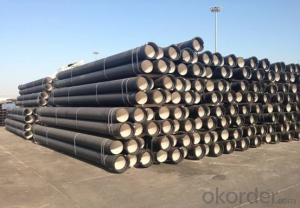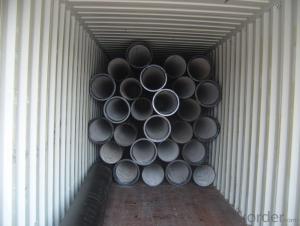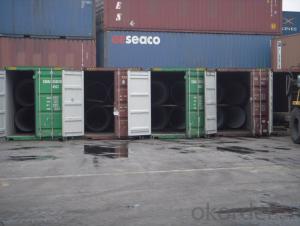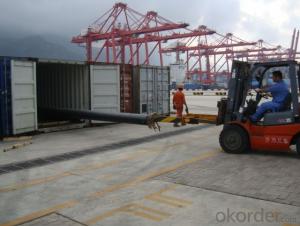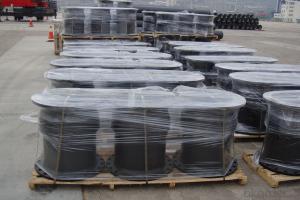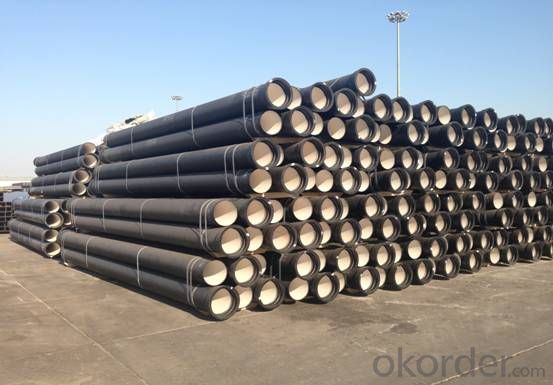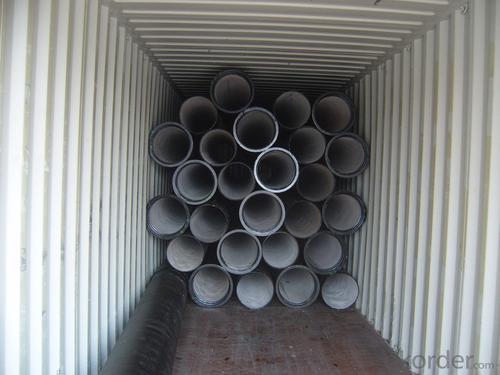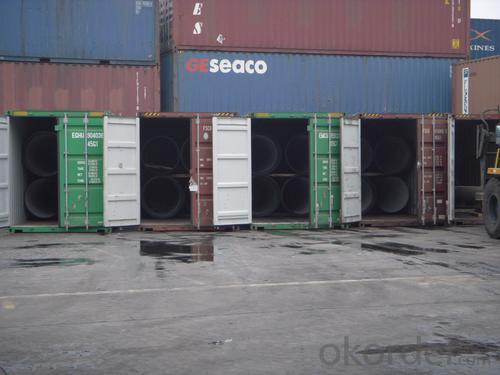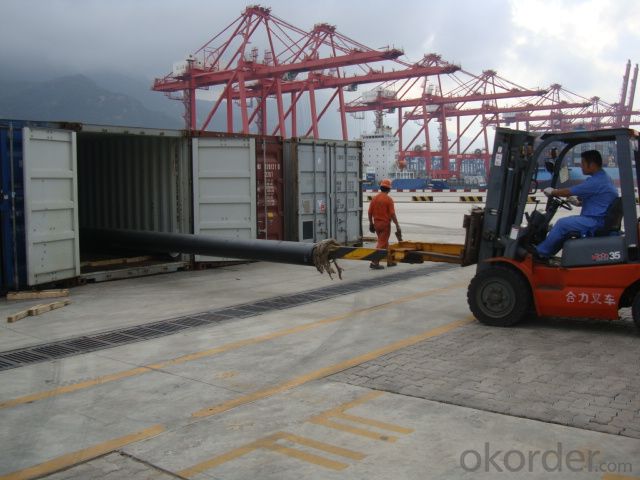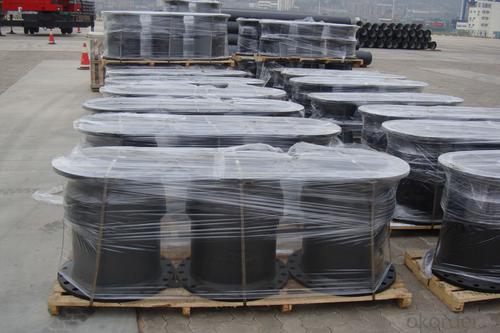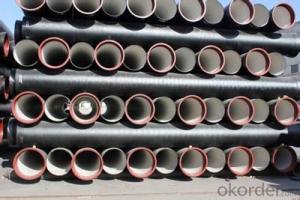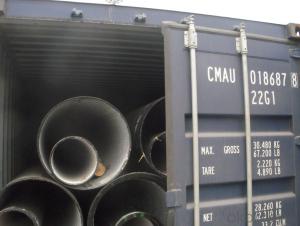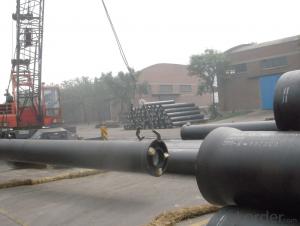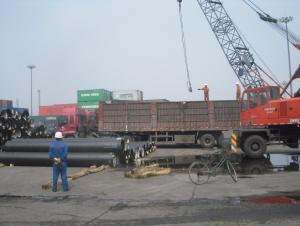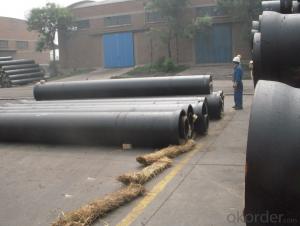DUCTILE IRON PIPES K8 DN600
- Loading Port:
- China Main Port
- Payment Terms:
- TT OR LC
- Min Order Qty:
- -
- Supply Capability:
- -
OKorder Service Pledge
OKorder Financial Service
You Might Also Like
Ductile Iron Cast Pipe is without any defects compare with tradition casting tech, which has many advantages particularly as follow:
(1) High density. In the "vertical upward casting" process, the melt iron of centre liquid column in center crystallizer is continuously feeding for volume shrinkage caused by condensation tube at outer circumference , which lead to be free of shrinkage porosity.
(2) High purity. When melt iron pouring, the mixed impurities such as gas, dross, sand grain which are lighter than melt iron could be eliminated at furnace mouth, its impossible to enter into the crystallizer through the channel, so the melt iron into the crystallizer is very pure.
(3) Strength with toughness. The cooling speed provided by continuous crystallizer is 30 times than sand casting and 5 times than centrifugal casting, and doesn't produce white iron, the eutectic cell volume of continuous cast iron is one eighth to one tenth compare with traditional cast iron. The density of graphite nodule in ductile iron can reach 300-700 pcs/mm2. Therefore, all reason above improve the strength and toughness of continuous cast iron.
(4) Free machining. The high speed cooling make the hardening phase (such as boride, steadite) not appear like reticular, massive or thick, but diffuse like fish bone and pane in shape, moreover, there are tiny graphite flakes inlaid hardening phase. It's free machining in BrinellHardness the range of 250-300HB. However, the Brinell Hardness of 250 is top limit to common metal materials.
(5) Uniform composition of tube wall. The convection mixing of liquid column caused by marching type drawing in crystallizer make the composition of tube wall well-distributed, and concentration gradient very little.
(6) High productivity. To the wall thickness of tube under 10mm, the speed of continuous casting is 1 meter/min, to the wall thickness of tube under 20mm, the speed of continuous casting is 0.5 meter/min, which is high efficiency that centrifugal or other casting tech couldn't reach.
- Q: How does ductile iron pipe perform in high-pressure gas applications?
- Due to its unique characteristics and properties, ductile iron pipe is an outstanding option for high-pressure gas applications. Firstly, its high tensile strength enables it to withstand the immense pressure exerted by gas flowing through the pipeline, ensuring leakage or rupture-free containment. Additionally, ductile iron pipe exhibits remarkable resistance to corrosion, making it ideal for gas applications that may encounter moisture, chemicals, or other corrosive substances. This corrosion resistance guarantees the pipe's longevity and minimizes the risk of damage or failure caused by corrosion. Another advantage of ductile iron pipe in high-pressure gas applications is its capability to handle thermal expansion and contraction. As gas is transported under high pressures, temperature fluctuations occur, resulting in pipeline expansion and contraction. However, ductile iron pipe's flexibility allows it to adapt to these changes without compromising its performance or structural integrity. Furthermore, ductile iron pipe's smooth interior surface reduces friction losses and pressure drops, resulting in efficient gas flow. This smoothness also reduces the likelihood of gas impurities or debris becoming trapped, potentially leading to blockages or flow disruptions. In conclusion, when it comes to high-pressure gas applications, ductile iron pipe is a dependable and durable choice. Its high tensile strength, corrosion resistance, ability to handle thermal expansion, and smooth interior surface all contribute to its exceptional performance in demanding conditions.
- Q: How do ductile iron pipes handle heavy traffic loads?
- Ductile iron pipes possess exceptional durability and have the ability to effortlessly withstand heavy traffic loads. This is primarily attributed to their remarkable strength and flexibility. The incorporation of graphite nodules in the composition of ductile iron allows for greater flexibility compared to traditional cast iron pipes. This enhanced flexibility empowers the pipes to endure substantial traffic loads, including the weight of vehicles traversing over them. Moreover, ductile iron pipes exhibit an elevated load-bearing capacity, enabling them to bear significant weights without experiencing any deformation or structural failure. Consequently, they are well-suited for deployment in areas characterized by heavy traffic, such as highways, bridges, and industrial sites. Furthermore, ductile iron pipes showcase exceptional resistance to external forces, such as vibrations and impacts. These pipes can effectively absorb and distribute these forces across the entire pipe network, thereby averting any potential damage and preserving the overall structural integrity. In conclusion, ductile iron pipes are explicitly engineered to manage the demands imposed by heavy traffic loads. Their strength, flexibility, and load-bearing capacity render them a dependable choice for infrastructure projects where durability and longevity are of utmost importance.
- Q: Do ductile iron pipes require additional protection against external factors?
- Yes, ductile iron pipes do require additional protection against external factors. While ductile iron is known for its strength and durability, it is still susceptible to corrosion and other external threats that can lead to pipe failure. One of the main external factors that ductile iron pipes need protection from is corrosion. Corrosion can occur due to the presence of certain chemicals in soil or water, and it can weaken the pipe over time. To protect against corrosion, ductile iron pipes are often coated with an external protective layer such as polyethylene or zinc. This coating acts as a barrier between the pipe and the corrosive elements, extending the lifespan of the pipe. In addition to corrosion, ductile iron pipes may also require protection against physical damage. These pipes are typically buried underground, making them vulnerable to external forces such as heavy machinery, ground movement, or even vandalism. To safeguard against physical damage, ductile iron pipes can be encased in concrete or surrounded by a protective sleeve or casing. Furthermore, ductile iron pipes may need protection against soil conditions that could potentially cause pipe movement or shifting. In areas with unstable soil, additional measures such as proper bedding and backfilling techniques, as well as the use of anchoring devices, may be necessary to ensure the stability and integrity of the pipes. In summary, while ductile iron pipes are robust, they still require additional protection against external factors. This can include corrosion protection, physical damage prevention, and measures to address soil conditions. By implementing these protective measures, the lifespan and performance of ductile iron pipes can be significantly extended, ensuring the reliable conveyance of water and other fluids.
- Q: What's the function of the cement mortar lining of ductile iron pipes?
- Active protection is superior to barrier coating, cement mortar lining, and a stable hydroxide film formed on the surface of ductile iron and steel pipe to form a protective layer. This kind of protective coating has excellent antiseptic properties because they spontaneously protect themselves even in discontinuous linings. A polymer in sharp contrast, such as an epoxy lining, is also barrier coating, but only if 100% is applied without leakage. Any interruption or leakage will cause corrosion.It has been documented that cement mortar and cement mortar have been applied to the field of water transportation and can meet the water quality standards for a long time. Some standards still apply to the world. Cement mortar does not support microbial growth. In the case of corrosive water or low flow rate (prolonged stagnation), it is better to use cement mortar lined pipes because it can maintain high pH values in the pipe. This does not cause health problems and can be prevented by very simple sealed coating methods. The natural characteristics of the sealing coating provide the best protection for the inner wall of the pipe, while ensuring that all the water quality indexes meet the quality requirements, low cost and high efficiency.
- Q: How does the white iron appear in the case of ductile iron?
- Casting cooling, surface and thin section at often produce white. White tissue hard and brittle, poor processing performance, easy peeling. So it is necessary to use the annealing (or normalizing) method to eliminate white tissue. The annealing process: heating to 2 DEG C 550950 ~ 5 h, then 500 to 550 DEG C Furnace cooling again followed by air cooling. During high temperature insulation, high travel cementite eutectic cementite decomposition of graphite and A in the subsequent two carburizing cooling process and eutectoid cementite decomposition, graphitization process. Due to the decomposition of cementite, resulting in the decrease in hardness, thereby improving machinability.Hope to help you.
- Q: What is the expected corrosion protection system for ductile iron pipes?
- The expected corrosion protection system for ductile iron pipes typically includes a combination of internal and external coatings, such as cement mortar lining and an external polyethylene or epoxy coating. Additionally, sacrificial anode systems or impressed current cathodic protection may be employed to further enhance the corrosion resistance of the pipes.
- Q: What are the risks in the process of conveying ductile iron pipes?
- Pile up: when the pipe is stacked, the lower part of the pipe should be covered with a tie or cushion block. The socket of the pipe is interlocked with each other, and the stop wedge must be put in place to prevent the pipe from rolling. Not allowed to be piled on marshes, rough slopes, or badly polluted areas.
- Q: Are ductile iron pipes suitable for bridge crossings?
- Yes, ductile iron pipes are suitable for bridge crossings. Ductile iron pipes are known for their high strength and durability, making them a reliable choice for various applications, including bridge crossings. These pipes can withstand heavy loads and are resistant to corrosion, which is especially important in bridge crossings where they may be exposed to harsh environmental conditions. Additionally, ductile iron pipes have the ability to flex and withstand ground movement, making them ideal for bridge crossings where the ground may shift or settle over time. Overall, ductile iron pipes offer the necessary characteristics to ensure the safe and efficient transportation of fluids or materials across bridges.
- Q: Can ductile iron pipes be used for stormwater management?
- Yes, ductile iron pipes can be used for stormwater management. Ductile iron is a strong and durable material that can withstand the pressure and load of stormwater. It is resistant to corrosion, making it suitable for long-term use in stormwater management systems. Additionally, ductile iron pipes have a smooth interior surface, facilitating a smooth flow of water and reducing the risk of blockages.
- Q: Are ductile iron pipes suitable for horizontal directional drilling?
- Yes, ductile iron pipes are suitable for horizontal directional drilling due to their high strength and flexibility, which allows them to withstand the stress and bending forces during the drilling process.
Send your message to us
DUCTILE IRON PIPES K8 DN600
- Loading Port:
- China Main Port
- Payment Terms:
- TT OR LC
- Min Order Qty:
- -
- Supply Capability:
- -
OKorder Service Pledge
OKorder Financial Service
Similar products
Hot products
Hot Searches
Related keywords
